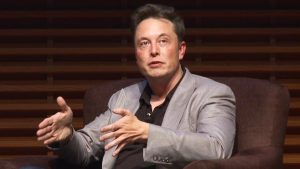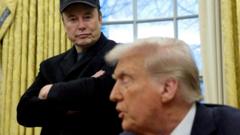Elon Musk has reignited discussions surrounding Wikipedia’s editorial integrity by criticizing its funding priorities and dubbing it “Wokepedia.” This pushback centers on claims of political bias, provoking a mixed response from the public and stakeholders.
Elon Musk Targets Wikipedia Over Alleged Bias in Editing Practices

Elon Musk Targets Wikipedia Over Alleged Bias in Editing Practices
In a provocative move, Elon Musk calls out Wikipedia, urging supporters to halt donations until the platform addresses perceived ideological imbalances.
Elon Musk is once again making headlines for his bold statements, this time taking aim at Wikipedia, the popular online encyclopedia. Recently, Musk urged his followers on X to cease their donations to the Wikimedia Foundation until the organization “restores balance to their editing authority.” His remarks, which referred to Wikipedia as “Wokepedia,” have reignited discussions on the platform's alleged ideological slant.
The billionaire's comments came in reaction to a graph shared on X that purportedly illustrated how 29% of Wikipedia's budget was earmarked for "equity" and "safety & inclusion" programs. Detractors, including Musk, contend that these budget priorities indicate a wider agenda that could affect Wikipedia's editorial policies.
“Stop donating to Wokepedia until they restore balance to their editing authority,” Musk tweeted, as he waded further into the growing discourse about perceived bias in digital information sources.
Adding fuel to the debate, a study led by David Rozado, an associate professor of computational science at Otago Polytechnic in New Zealand, discovered potential discrepancies in Wikipedia’s portrayal of political figures. Newsweek highlighted that Rozado's research indicated that the platform tended to depict right-leaning individuals in a more negative light than their left-leaning counterparts.
Despite the mounting criticism, the argument is still in flux. Wikipedia co-founder Jimmy Wales has constantly rejected claims of a left-wing bias, maintaining that the platform stands firm on its commitment to neutrality. Wales and his supporters argue that assertions of Wikipedia being “woke” are largely anecdotal and overlook the intricacies of collaborative editing.
Musk’s comments have elicited varied responses across social media. Some users applaud his quest for greater accountability, while others raise concerns over his motivations, suggesting that Musk’s call for “neutrality” may coincide with his personal beliefs. No matter the mixed reactions, his intervention has reignited focus on the crucial issues surrounding neutrality and transparency in key information platforms like Wikipedia.
As this debate unfolds, it highlights a broader concern about bias in online media and the pressing need for well-rounded information amid a polarized public discourse. Wikipedia’s vital position as a knowledge repository means this issue resonates globally, ensuring continued scrutiny from critics and advocates alike.



















